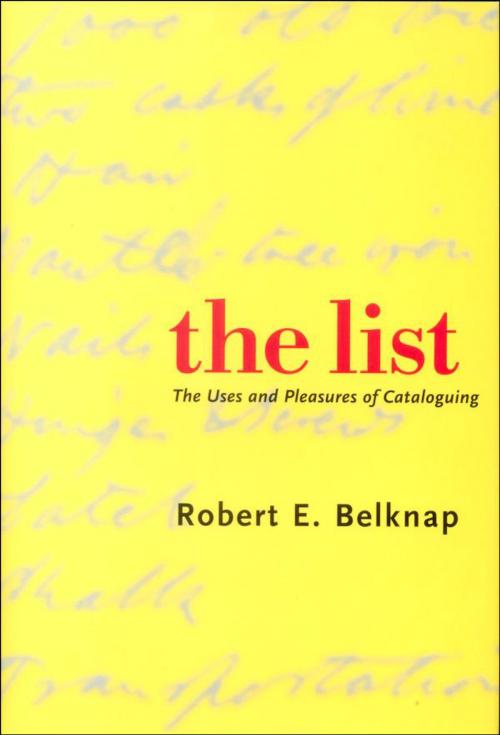| Author: | Dr. Robert E. Belknap | ISBN: | 9780300127195 |
| Publisher: | Yale University Press | Publication: | October 1, 2008 |
| Imprint: | Yale University Press | Language: | English |
| Author: | Dr. Robert E. Belknap |
| ISBN: | 9780300127195 |
| Publisher: | Yale University Press |
| Publication: | October 1, 2008 |
| Imprint: | Yale University Press |
| Language: | English |
I am no more lonely than the Mill Brook, or a weathercock, or the north star, or the south wind, or an April shower, or a January thaw, or the first spider in a new house,” wrote Henry David Thoreau in Walden. In creating this list, and many others that appear in his writings, Thoreau was working within a little-recognized yet ancient literary tradition: the practice of listing or cataloguing. This beautifully written book is the first to examine literary lists and the remarkably wide range of ways writers use them.
Robert Belknap first examines lists through the centuries-from Sumerian account tablets and Homer’s catalogue of ships to Tom Sawyer’s earnings from his fence-painting scheme-then focuses on lists in the works of four American Renaissance authors: Emerson, Whitman, Melville, and Thoreau. Lists serve a variety of functions in Emerson’s essays, Whitman’s poems, Melville’s novels, and Thoreau’s memoirs, and Belknap discusses their surprising variety of pattern, intention, scope, art, and even philosophy. In addition to guiding the reader through the list’s many uses, this book explores the pleasures that lists offer.
I am no more lonely than the Mill Brook, or a weathercock, or the north star, or the south wind, or an April shower, or a January thaw, or the first spider in a new house,” wrote Henry David Thoreau in Walden. In creating this list, and many others that appear in his writings, Thoreau was working within a little-recognized yet ancient literary tradition: the practice of listing or cataloguing. This beautifully written book is the first to examine literary lists and the remarkably wide range of ways writers use them.
Robert Belknap first examines lists through the centuries-from Sumerian account tablets and Homer’s catalogue of ships to Tom Sawyer’s earnings from his fence-painting scheme-then focuses on lists in the works of four American Renaissance authors: Emerson, Whitman, Melville, and Thoreau. Lists serve a variety of functions in Emerson’s essays, Whitman’s poems, Melville’s novels, and Thoreau’s memoirs, and Belknap discusses their surprising variety of pattern, intention, scope, art, and even philosophy. In addition to guiding the reader through the list’s many uses, this book explores the pleasures that lists offer.















